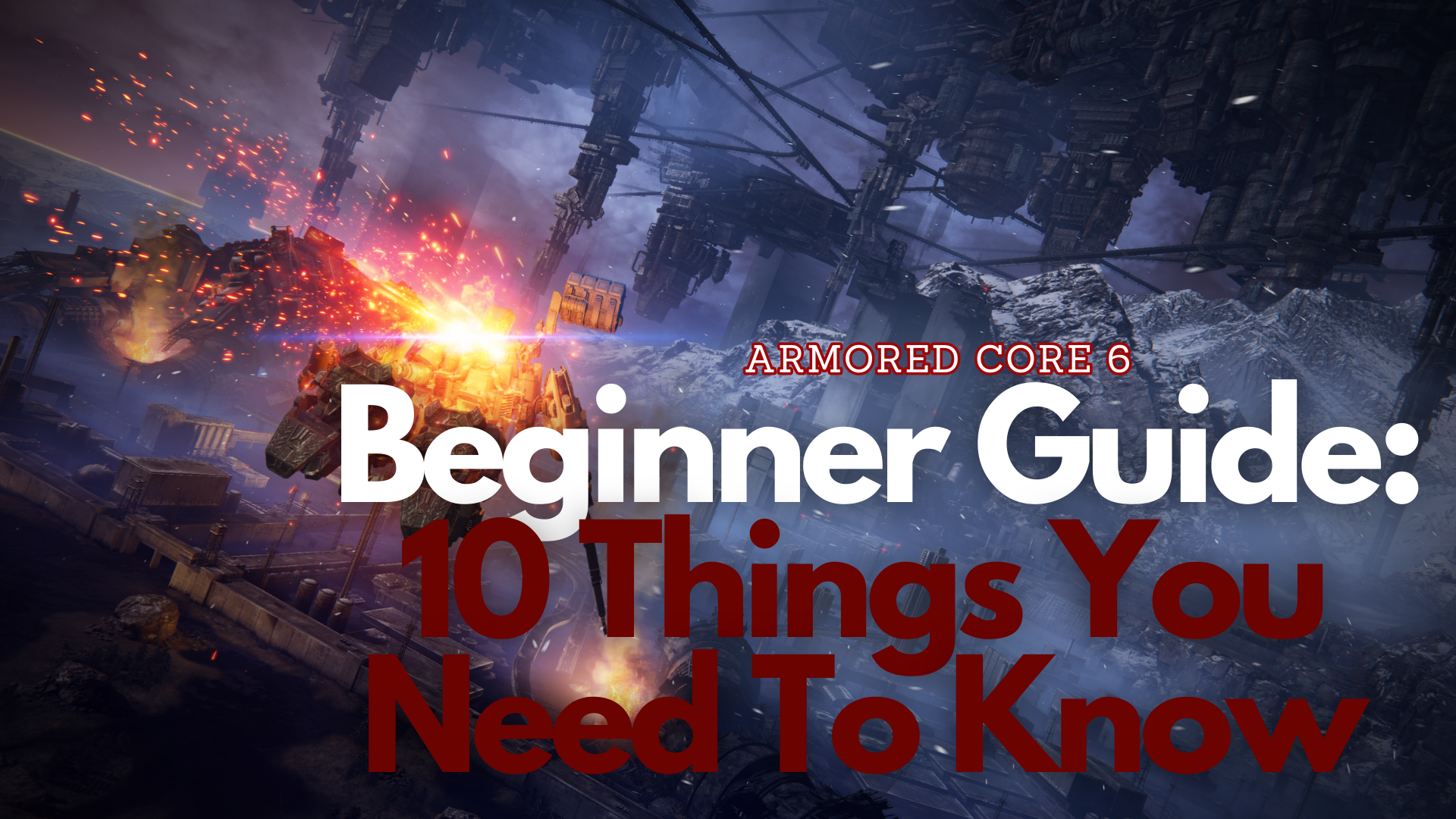Felt a little bit intimidated by the looks of Armored Core 6, and how long this franchise already exists for? In this beginner's guide, we tackle the five most important things you need to know before starting the game!
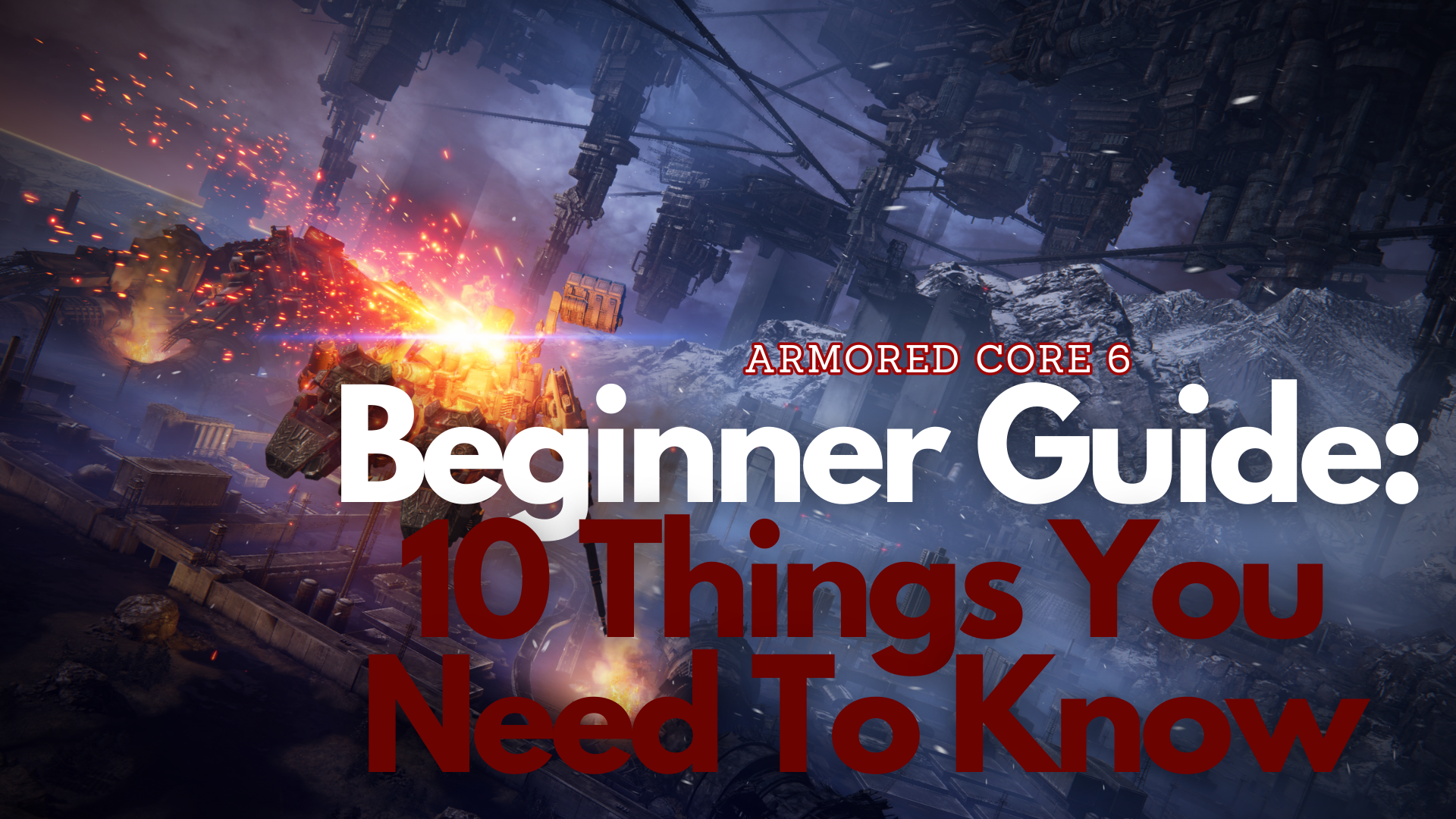
If you're new to the Armored Core franchise, and feel a little bit intimidated by the setting, design and how bulky the Units looks, I can assure you: It's not nearly as scary and inpenetrable as it looks!
Thankfully, Armored Core is not a hyperrealistic simulation, but rather an intuitive (if unique) third-person-shooter. FromSoftware tried to deliver the most natural way of piloting a 32.8 foot tall Armored Core mecha – I can't really imagine how it must feel like piloting one in real life, but it would definitely be super amazing.
In this beginner's guide, we tackle the five most important things you need to know before (literally) starting your engines in the game!
Armored Core 6: The Beginner's Guide
Here you'll discover a wealth of information on all things you need to know to get into Armored Core, along with several tips and tricks. We start by explaining basic terms related to Armored Core 6 and go all the way to how you build your own mech and so much more
Getting Started
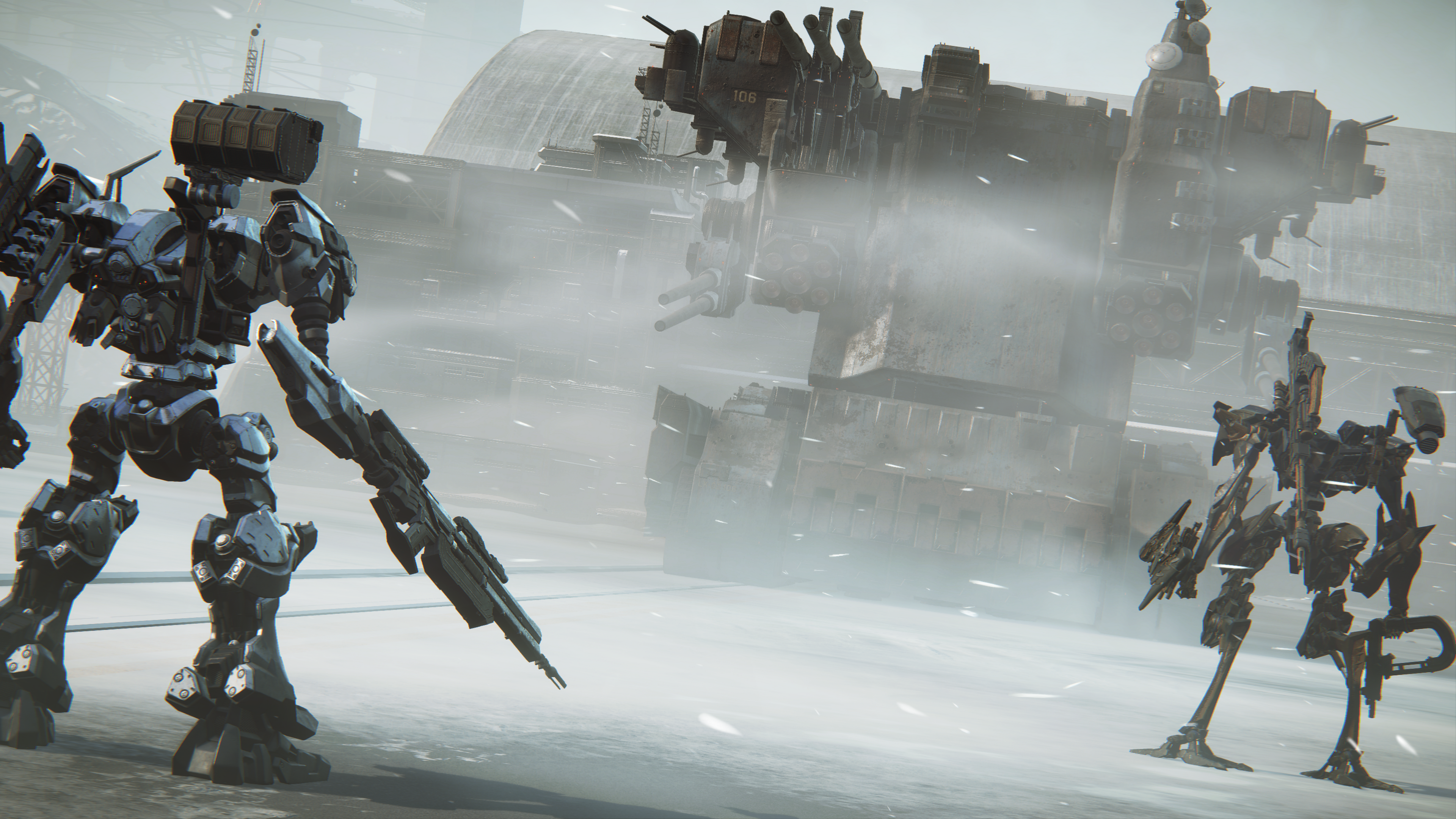
- Armored Core (AC): The machines you control, colloquially they're often just called "mechs" or "mecha"
- AP (Armor Points): This is the health of your AC
- EN (Energy): This is produced by a Generator in your AC and will be consumed by Boosters and Energy Weapons
- Charging: This is when the energy is completely depleted and the AC needs to recover
- Units: Offensive items used to fight enemies and bosses alike
- Frames: The general term for the following components of your AC: Head, Core, Arms, Legs, Booster, Fire Control System, Generator and Units
- Builds: An arrangement of items, like Units and Frames, to bring the most out of your AC and create a mech that suits your playstyle. For example: If you like to have the primary role of absorbing damage, while not be able to maneuver much around, a tank build is best suited for you
- Garage: There you will customize your Mechs to your heart's content
- Repair Kit: Grants you the ability to heal yourself
- Handler: An overseer of a mission, providing you with intel and directives
- Operator: A person who monitoring the unit's vital stats from a remote place
- Supply Stations: Is a strategic checkpoint, where you can pause, regroup and replenish your ammunition
- Rubicon 3: The distant world where Armored Core 6 takes place
- COAM: In-game currency you need to purchase your equipment
What Kind Of Game Is Armored Core
In Armored Core 6, you won't have a big open world to freely explore. Instead, you'll have various missions that are all part of a main storyline. Once you finish a mission, you can choose to play the next story mission, redo a previous one, train, or take an AC test.
Unlike in FromSoft's previous Soulsbourne games, you don't have a huge open
Everything you do is important because you'll earn the COAM currency, which you need to upgrade and customize your Mech as you go forward in the game.
Combat Is Fast, Be Quick On Your Feet
Armored Core 6 is a fast-paced third-person action-shooter, where you must time your moves carefully, as every single mistake can lead to your demise.
Engage intense battle with smaller groups of enemies and distinctive boss battles, where analyzing movement patterns and striking at the right time is key to victory. Sounds oddly familiar...
You'll find lots to discover in a vast combat arena, while you're maneuvering your AC horizontally and vertically through the boosting and dashing skills. This is very important to remember: in Armored Core, you're not just super fast, but also super mobile. Don't stand around, use your mobility and always be on the move.
One thing that might be strange to new players is the sensation of being able to fly around. Mastering the art of attacking enemies while in mid-air will make fights a lot easier. So if you're stuck on the ground too much, change that and start flying.
It's Not A Souls Game, But...
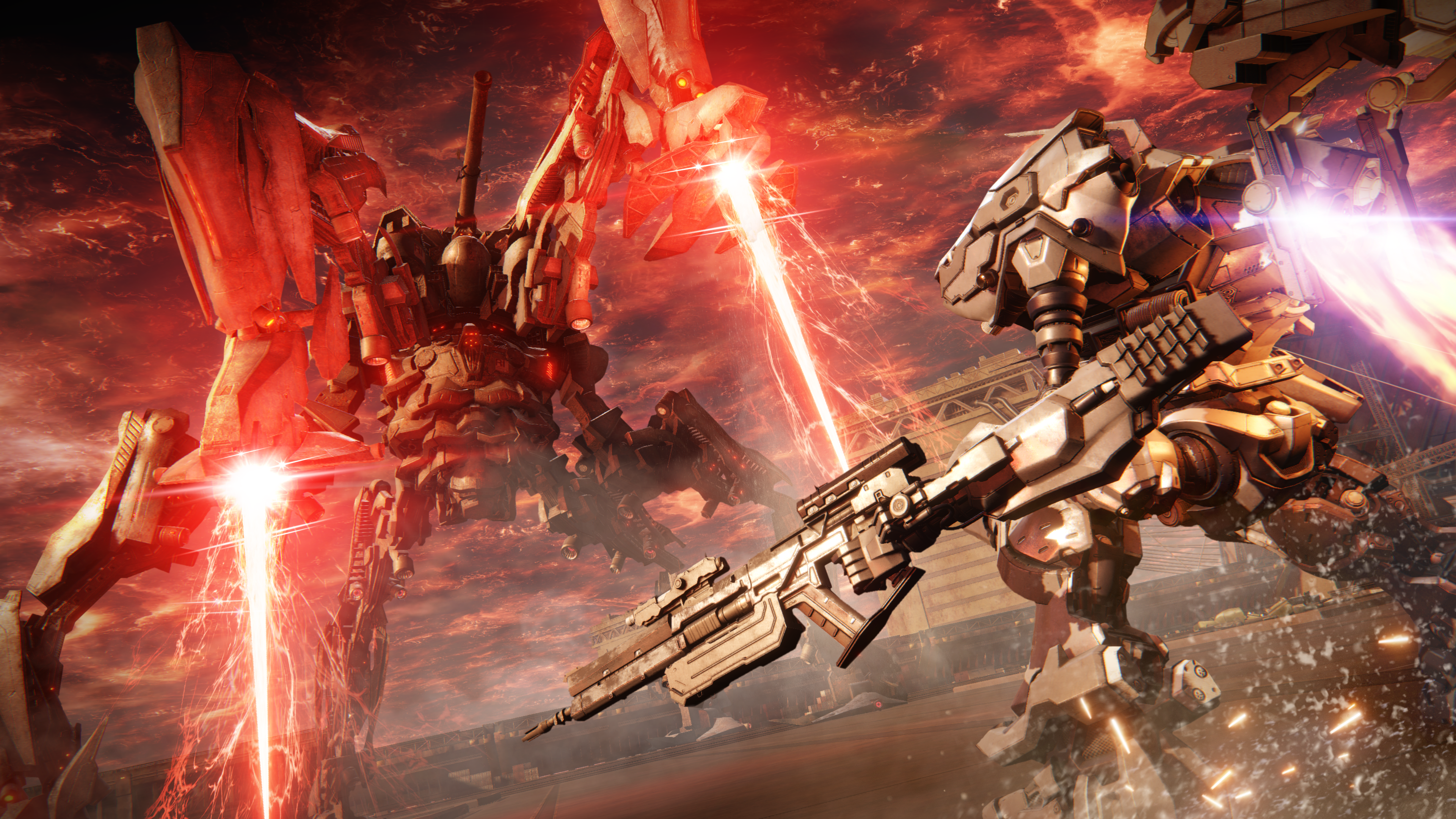
Armored Core 6 is definitely not a Souls-like, in any way. Well, in some ways, maybe. The FromSoftware DNA is of course very palpable, especially in the boss fights. If you came to FromSoft through Dark Souls, Elden Ring and so on, these will feel familiar to you... at least to some degree.
The bosses in AC6 take a similar approach to the ones in FromSoft's breakout hit series. They usually have very readable attack patterns, which you'll need to memorize and counter-attack. Learn when to dodge, be patient and strike at the right moment. Everything is just ten times faster than in Souls, don't forget that.
Focus On Staggering Enemies
Another thing that might remind FromSoftware fans of one of their old games is the Impact system. Yes, this is sort-of similar to Sekiro's Posture system. This means that if you fill an enemies impact meter, they'll be staggered, leaving them stunned for a time and more vulnerable to your attacks.
Focus on filling the impact meter as quickly as possible to deal high damage quickly!
Equipment Explained
Besides the visual customization, you can also equip your AC with different units at the same time. They are mainly your source of strength, as you are defending yourself against the enemy.
Each arm has two different units at its disposal. Let's take a look:
- R-Arm Units = Ranged weaponry, with a mediocre Attack Power, but low recoil and a lot of ammo
- L-Arm Units = This Unit falls under the "Variety" category. You can install anything that suits you and your playstyle best on this Arm. Like Rifles, Shotguns, Gatling Guns, Bazookas, Laser Blades and more
- R-Back Units = Offensive weaponry, with a reload or cooldown time
- L-Back Units = Ranged offensive weaponry with the possibility swapped out by a defensive option
However, you have a lot of options to customize your AC itself, outside of the weapons. Here are all different parts of your AC:
- Head
- Arms
- Legs
- Core
- Generator
- FCS (guidance system)
- Boost Thrusters
- Operating System (unlocks features like Assault Armour)
Customize Your Mech And Don't Be Afraid To Change It
Building your own, individual mech is a vital part of Armored Core 6. It's like choosing between a Berserker and Wizard in a fantasy setting. Every piece will affect your play style tremendously and determine how you approach combat.
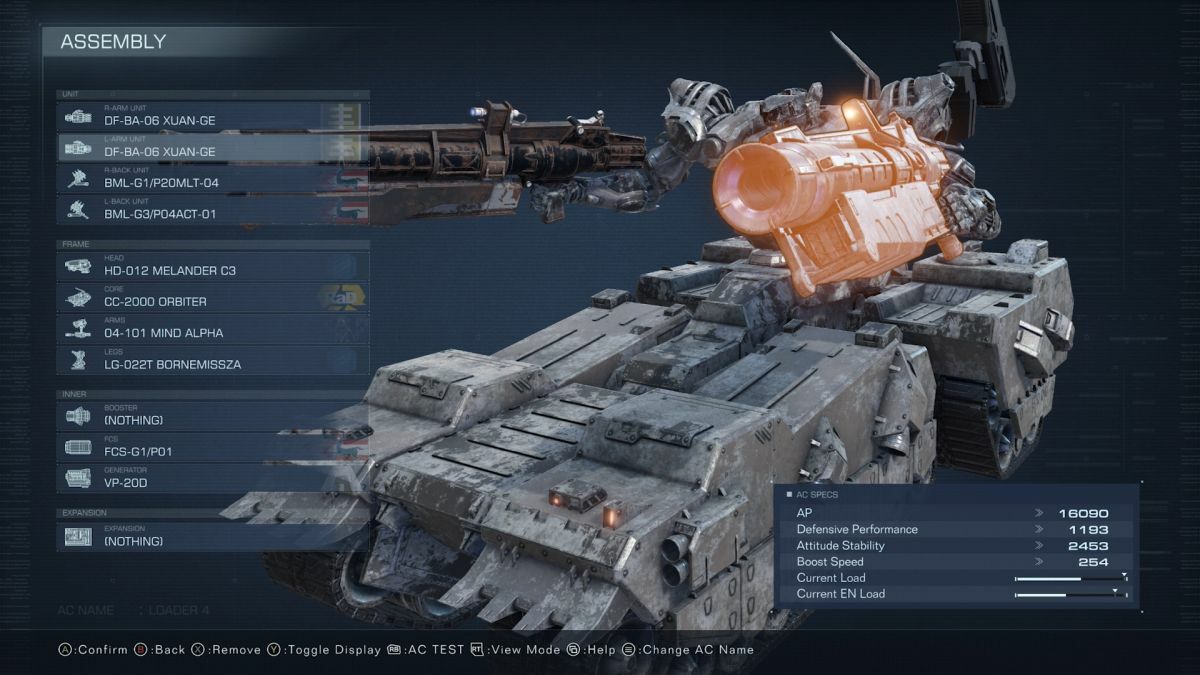
You can either avoid getting caught and stay out of reach, or charge right in and knock down anyone blocking your way. In the past installments, you could also use stealthy equipment to become invisible. I really hope we can do that again this time!
One of the most important things in Armored Core is a willingness to change your build. If you struggle with a particularly tough boss, go back to the Assembly (which you can access after dying) and change around your build. This will be key to overcoming even the toughest challenges.
Different Legs, Different Game
Maybe the most important parts of your AC are its legs. There are four different leg types, and they fundamentally change the way the game plays. Movement is completely different with each leg type, so experiment and see which one fits you (and the different combat sitautions in the game) the best.
Sell Your Parts (But Not All Of Them)
You can buy new parts in the Garage, and also sell them. Thankfully, you can sell every part for the same price you bought it at. Neat! That should encourage you to try out different things, as you don't have to be afraid of losing money.
However, don't overdo it and sell everything. You can change your AC's loadout mid-mission, and you should take advantage of that feature whenever you feel like you're stuck. Having some different parts, whether it be legs, weapons, arms or anything else, in your back pocket could save your life!
Don't Ignore The Arena
The Arena is a staple in Armored Core and of course it's back for the sixth main installment in the series. You unlock the Arena in chapter 1 and will unlock more and more fights the further you progress through the game.
The Arena fights are not just fun, as they pit you against AI-controlled ACs, they also reward you with OS Chips. And those are particularly valuable...
OS Tuning Is Very Neat
OS Tuning is a new feature, which allows you to trade OS chips with special and powerful upgrades for your AC. This includes a ton of different things, from useful combat abilities like Core Expansions to the option to upgrade your healing.
This is really useful and should be focused on by new players, as the OS upgrades can give you the edge on the battlefield.






























